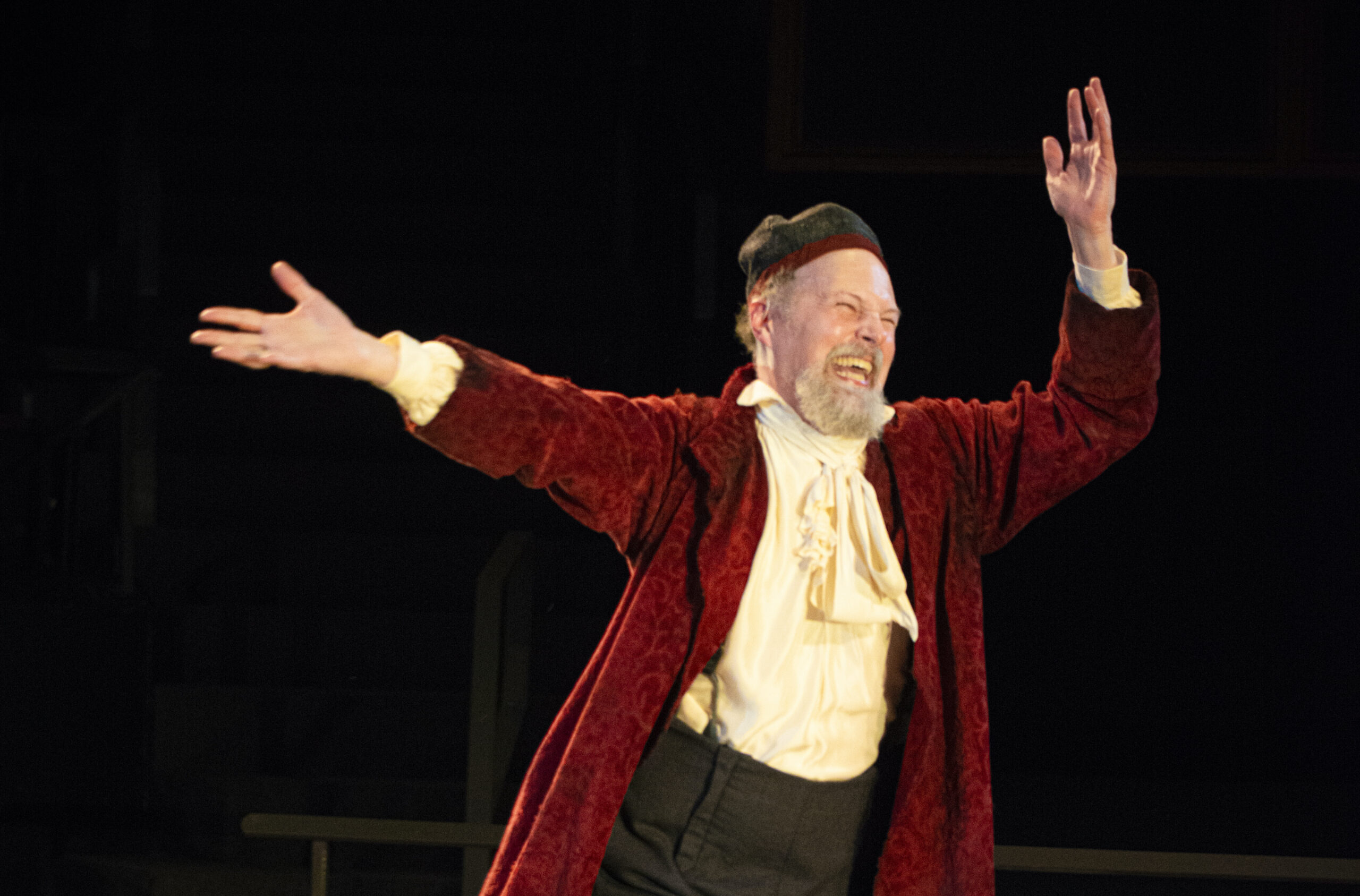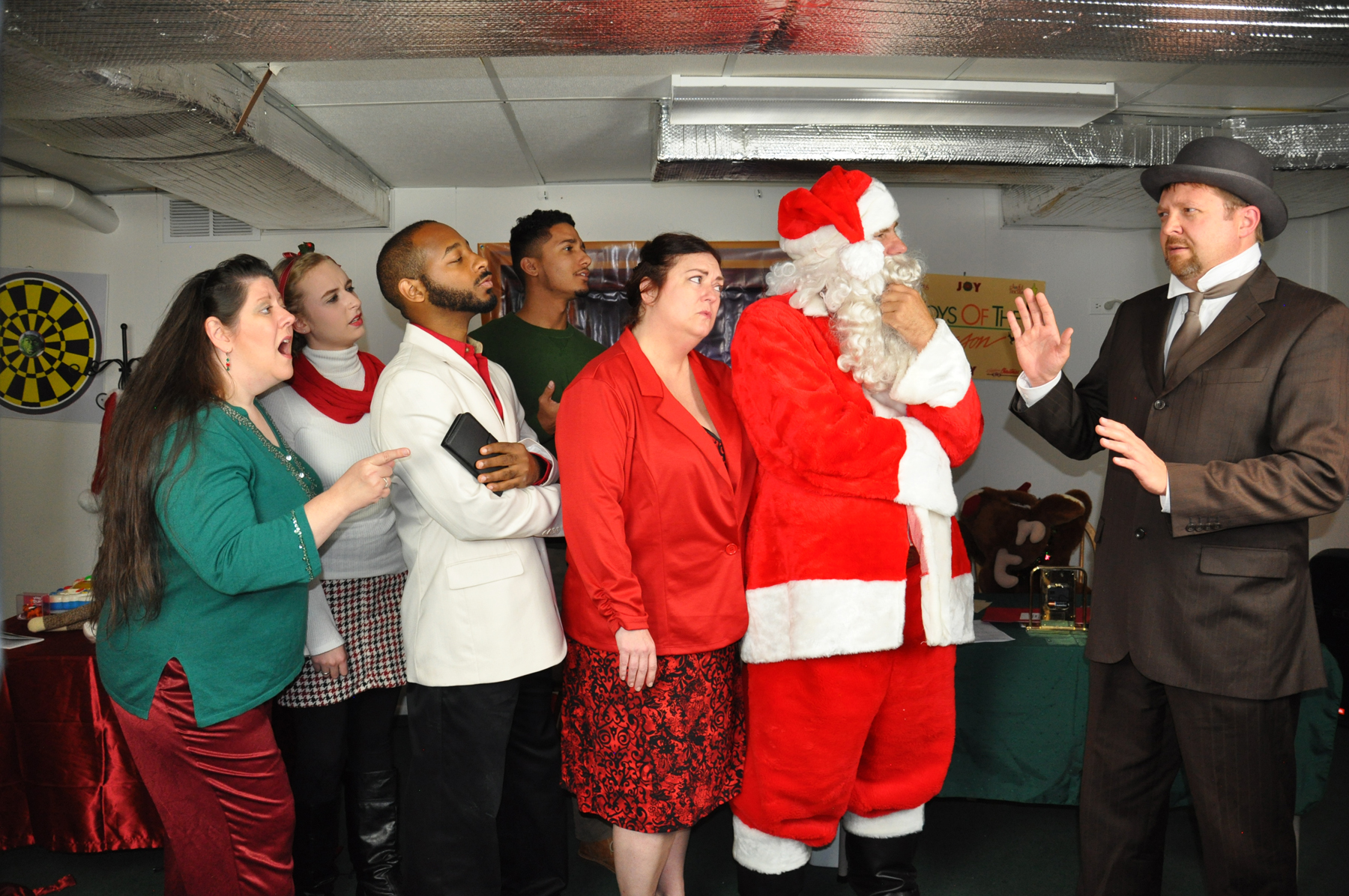Gregory Maupinin A Christmas Carol Ghost Story. Photo: Yunier Ramirez
A Christmas Carol Ghost Story
Adapted and Directed by Robert Barry Fleming
Based on the novel by Charles Dickens
In collaboration with Agile Lens
A review by Tory Parker
Entire contents are copyright © 2022 by Tory Parker. All rights reserved.
Actors Theatre of Louisville’s annual production of (Fifth Third Bank’s) A Christmas Carol was beloved, to begin with. There is no doubt, whatever, about that. I might have been inclined, myself, to regard (Fifth Third Bank’s) Dracula as the most beloved traditional holiday play, but the wisdom of our ancestors is in the attendance numbers. You will therefore permit me to repeat, emphatically, that A Christmas Carol was beloved.
This production of A Christmas Carol Ghost Story has something that theatre companies across the country have long started to believe was a ghost of the past—a sold-out run. I, therefore, feel that the stakes of this review are the lowest they could be, but I feel a responsibility to talk about this production honestly and with a lot of input from other attendees and friends. I say that with a massive disclaimer that ALL opinions expressed here are mine alone.
Since 2020, Actors has committed itself to tell stories and creating work that is revolutionary, transmedia, multiplatform, and “strategically centers experiences that reflect a civic commitment to the social good and the health and wellness of the many constituents we serve.” I love this. Theaters, as much as I love them and believe in the worth of the art form, have historically been toxic, unsustainable, abusive, bigoted institutions, deeply out of touch with their audiences and community, and it needs to change. And many theatre companies across the country have been making similar commitments to change and evolution.
So why do theater companies continue to produce A Christmas Carol across the country every single holiday? Is it because it’s a guaranteed money-maker that pays for other, riskier work in the season? Is it because it’s become a holiday tradition in the community and the audiences love it? Maybe it’s because it brings in younger audiences and introduces them to the art form. By and large, I’m sure it’s all of the above, how do you revolutionize this 179-year-old British story that your audience has been reading, listening to, and watching their entire lives?
At Actors, the answer comes in the form of a one-man production featuring motion-capture ghosts. This production was done in a “lab” form last year, with a very brief run and limited seating, or could also be experienced through a VR headset from home.
Personally, I find it disheartening that Actors do not believe in, or has no wish to find or explore what is already revolutionary about A Christmas Carol. This is the story of a wealthy miser, who ruins not only his own happiness but the happiness of his loved ones and neighbors in pursuit of wealth, but who finds it in himself to change, become generous with his money and his spirit, and live the rest of his life in joy and community. This is a story that proclaims that our time on earth and how we treat each other during it matter—more than anything else. It’s a story about how none of us need to be beyond redemption, and that changing is a choice. And of course, all of that stands to get lost when you’ve seen the play every year for 30 years, or when you have to pay $100+ for a single ticket, but that story remains revolutionary and achingly relevant.
It also stands to get lost when the only other beings on stage are projected onto a screen. I have no doubt that the process of motion capture is incredibly impressive, and hats off to the team at Agile Lens for their creativity. But in a world where our most up-to-the-minute understanding of “motion capture” means Avatar 2, these graphics simply cannot compare. They also don’t appear to be doing anything an actor, or even a recording of an actor, could not do without motion capture. The motion capture is not done live—it’s a 2021 recording of two incredible local talents, Kavin Moore and Beebee Patillo, who serve as the conduits, but not the voice actors.
Every character in the show is voiced by Gregory Maupin. And congratulations to Greg, he is a marvel and a talent and is clearly giving heart and soul. But he is alone from beginning to end, his own voice recorded and blaring back at him, serving as both car and driver to his own story. But in this myriad of characters and relationships happening onstage, the one that really matters—the relationship between performer and audience—is completely neglected.
From what I know, the first and most important rule of doing a one-person show is determining the role of the audience. This doesn’t mean they are participants, necessarily, but if there is no connection established with the audience and there are no other actors, then what are we there to experience? What stakes are keeping a family who knows the plot of A Christmas Carol backward and forwards in their seats, when everything about this production will go on exactly as it always will whether they go or stay. In whom can they be invested when our actor is serving as a narrator describing a character’s action, rather than doing the action, over and over again? What we’re left with is a beautiful audiobook featuring some ghosts straight out of the uncanny valley.
In an effort to make A Christmas Carol unlike any the community has ever seen, this became a production severed from everything that made it something they wanted to see. After the show ended, my friend and I went to the bar next door. Several groups of people who had been at the show were already there—roughly half of the full house that started the hour-and-fifteen-minute performance did not stay until the end. The earliest group left around the appearance of the ghost of Christmas Past, and by the ghost of Christmas Yet to Come, whole sections of the audience were gone.
We talked to some of the folks who had left. One group was an older couple, their two adult children, and their spouses. Seeing Carol at Actors Theatre had been something they’d been doing since their children were small, and they were excited to see that it had returned.
“We didn’t know it was a one-man show,” they told us. “I just saw “Christmas Carol” and assumed—I guess that’s our fault. If we’d known what to expect, it might have been different.”
“It just didn’t have the magic,” another attendee said. “I loved the aerialist, and the carolers, and all the little kids in the cast. I miss it. This was so joyless.”
I’m not one who says that arts organizations should continue to do things they’ve always done because they’ve always done them. I’m not even one to advocate for them continuing to do something just because their audience loves it. I believe artists should make the art they want to make, and that we as people who love art and believe in its value, should open ourselves up to change, and ready ourselves for discomfort. We should be excited about new work and celebrate artistic risks. We should uplift the voices of artists who are showing us a new way to see the world.
That being said, I do not know what this production is trying to offer or to whom. It seems to be bending to the desire of the community to have an Actors Theatre production of A Christmas Carol without taking into consideration any of the reasons the audience loved it. And if Actors really wants to build community and enrich the quality of life by engaging people in theatre that reflects the wonder and complexity of our time, as their mission statement says, I am struggling to find a way in which this production, which seemingly intentionally alienates an audience ready to have their minds blown, their heartstrings pulled, their own morality questioned, lives into that. Here are houses full of people who have willingly bought a ticket to a show about how wealth and greed are the root of evil, about how we all have the power and responsibility to be better people, and instead the takeaway seems to be “bet you guys haven’t seen a motion capture play before.”
I’m excited to see what comes next from Actors Theatre. There is remarkable talent working there, and so much passion for a craft I believe in my core. I have seen performances in that same space, the Bingham Theater, that changed my relationship with the art form, to my community, and to humanity. I wish this production, based on a story that rips apart the fallacy of individualism and reminds us that we are responsible for each other in this life, had been one of those experiences.
A Christmas Carol Ghost Story
December 14-23, 2022
Actors Theatre of Louisville
Bingham Theatre
316 West Main Street
Louisville, KY 40202
Actorstheatre.org
Tory Parker, originally from West Virginia, is now a proud Kentuckian as well. In Louisville, she’s worked and/or performed with Claddagh Theatre Company, the Chamber Theatre, Bellarmine University, Wayward Actors Company, Derby City Playwrights, Company Outcast, and director Emily Grimany. As a playwright, her original works appeared in the National Women’s Theatre Festival in their 2020 and 2021 Fringe Festivals.





